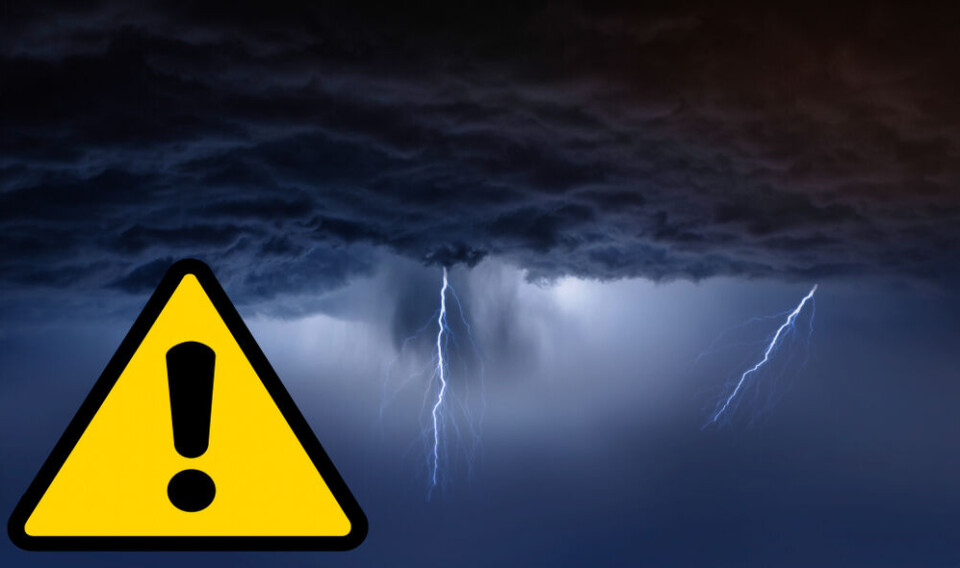-
100 more supermarkets in south of France are to rebrand to Carrefour
Stores impacted are small convenience shops in the centre of cities or smaller supermarkets in rural towns or villages
-
Why facts of British couple’s deaths in south of France are slow to emerge
The investigation highlights stark differences in procedures between France, UK and US
-
Map: Are there new Michelin star restaurants near you in France?
The new Michelin Guide France 2025 awarded 78 new stars to restaurants across the country
Warning to stay home as red storm alerts raised in France
[Updated 16:30 November 1] Winds of up to 170km/h to strike Brittany and Normandy on Wednesday night and Thursday morning

[Update, 16:30 on November 1: Météo France's latest update states: Red severe wind alert for: Finistère, Côtes d'Armor, Manche. Orange severe wind alert for: Nord, Pas de Calais, Somme, Oise, Seine-Maritime, Calvados, Eure, Val-D'Oise, Paris, Yvelines, Orne, Eure-et-Loire, Ille-et-Vilaine, Mayenne, Sarthe, Morbihan, Loire-Atlantique, Maine-et-Loire, Hauts-de-Seine, Seine-Saint-Denis, Val-de-Marne and Vendée. All Atlantic coast departments from Finistère to Gironde and all Channel coast departments will be under orange wave-submergence alert.
3,200 firefighters are on alert in Côtes-d'Armor, Ille-et-Vilaine, Finistère and Morbihan, Interior Minister Gérald Darmanin has said, including 650 in Finistère alone.]
Extremely violent winds, heavy rain and lightning will strike the coasts of Brittany and Normandy from Wednesday night to Thursday morning.
Météo France has issued its highest alert for severe weather in three departments in Brittany and Normandy.
The departments on maximum alert are Finistère, Côtes-d’Armor and Manche.
The extreme weather will begin from midnight on Wednesday and last until Thursday morning with winds of up to 170km/h forecast and local flooding expected.
Météo France also issued a weather warning for all departments in the west of France due to the danger of high winds and flooding.
People in affected areas are being urged to stay at home as Storm Ciaran approaches.
The danger for people at sea is even more severe. The winds will result in waves of up to 10m in affected areas.
Cross channel ferry services will be highly impacted, as will trains and air transport.
TER local trains will not operate in Brittany, Pays de la Loire, Normandy, Centre-Val de Loire and Hauts-de-France on Thursday (November 2).
[Update, 16:30 on November 1: SNCF Bretagne has said that TGVs will only run between Paris and Rennes for Brittany, without going as far as Brest, Quimper or Saint-Malo. Trains from Paris to Normandy have been cancelled. Quimper airport is also closed until Thursday.]
The bad weather has also forced Brest-Bretagne airports to close, at least until 09:30 tomorrow.
Read more: No trains in five French regions and airport closes in Brest
The storm will reach its greatest intensity between 05:00 and 10:00 on Thursday November 2 on the Atlantic coast of Brittany, and between 12:00 and 14:00 on the Channel coast. It should lose its intensity through the afternoon.
Météo France says the storm will be one of the worst for the past 40 years.
“If we take into account the wind speed and the regions affected, Storm Ciaran will be among the 40 major storms since 1980, even if it does not reach the level of historic storms like Lothar and Martin,” Météo France stated in a press release.
‘Stay at home’
Mr Darmanin has urged people to “stay at home on the night of Wednesday to Thursday”. Tourists in the areas are advised to leave for home as soon as possible.
[Update, 14:00 on November 1: Rennes has cancelled all its open-air markets and public parks are closed all day. In Sables d'Olonne, Vendée, the coastal path will be shut from 21:00 tonight, and access to all beaches is closed. Prevention measures and harbour closures are also in place in Morbihan and Finistère.]
People who live on the coast should go to safer ground and look after vulnerable people, the minister said.
Related articles
VIDEO: Tornado uproots trees in small town in southern France
























